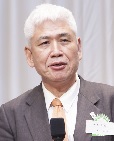Small and Medium Enterprises are Vital for Japan
August 3, 2016
Mr. Hisayoshi Hashimoto
Professor Emeritus,
Graduate Institute for Policy Studies
�� I joined the Ministry of International Trade and Industry (currently the Ministry of Economy, Trade and Industry) and made it a rule to visit factories every Thursday 29 years ago. Ever since, I have visited 3,708 factories and got attracted to many fascinating, enthusiastic and self-assertive presidents of small and medium enterprises (SMEs). I found them a little different from CEOs of larger companies. I noticed that big companies found it easier to attract many applicants with competence, but SMEs needed a president with appealing and virtuous character to attract new recruits and to retain such valuable employees. The sustainable business of a SME depends largely on the personality of its president who plays a vital role in securing loans from financial institutions as well as receiving orders from parent companies.
I joined the Ministry of International Trade and Industry (currently the Ministry of Economy, Trade and Industry) and made it a rule to visit factories every Thursday 29 years ago. Ever since, I have visited 3,708 factories and got attracted to many fascinating, enthusiastic and self-assertive presidents of small and medium enterprises (SMEs). I found them a little different from CEOs of larger companies. I noticed that big companies found it easier to attract many applicants with competence, but SMEs needed a president with appealing and virtuous character to attract new recruits and to retain such valuable employees. The sustainable business of a SME depends largely on the personality of its president who plays a vital role in securing loans from financial institutions as well as receiving orders from parent companies.
��Many presidents shared how their business had evolved and the latest trend of products. Their information was demonstrative and more illustrative than various statistical data. I was often impressed by small family-run factories that excelled in inventiveness. I have attentively observed factories, including those in China, India, Vietnam and other developing countries, to assess what have made Japanese SMEs so vital and attractive.
��SMEs in Japan are most concerned about the future course of manufacturing. I often say factories are not like ��an amusement park like Disneyland or Universal Studio,�� a glamorous place where many young people get attracted to. When I was working for the Ministry, I was given a chance to work at an iron foundry for one week. I helped die casting and witnessed firsthand that factory workers repeated the simple process 400 times a day, thinking hard how to improve labor efficiency and to satisfy the customers with better-quality lower-priced products. I was impressed to learn highly-motivated workers teamed up to maximize their productivity.
��There are numerous subcontracting companies with a high level of expertise in Japan, providing technical support to manufacturing companies. Highly competent craftsmen work hard to make sure your order is duly processed. Even if you give them a rough outline or sketch, they will complete a detailed drawing and deliver the finished products by the due date. This is how things work in Japan. Now, I must say you cannot expect the same quality of work in developing countries. This is because there are only a limited number of qualified craftsmen with suitable equipment to meet your order. Also in not a few cases, there is a gap between what they say they can do and what they can actually perform. You have to pay extra careful attention to avoid delay in delivery or ending up with defective products.
��Let me cite an example in China. Not a few successful Chinese business executives had planned to open factories in Japan, up to the bankruptcy of Lehman Brothers. If you want to produce top-quality products, it is more economic and rational to choose Japan as a site for manufacturing. This is because factory workers and engineers in China tend to leave for work that pays better. Factories that lose the majority of their employees within three years suffer greater quality control problems.
��China is currently stuck in a serious economic slump due to its massive campaign against corruption of politicians and public officials that suspended public works. Western companies, therefore, have started to opt for the so-called ��China Plus One strategy�� and diversify away from China to open production facilities in other Asian countries, including Vietnam, Thailand and Indonesia. Let me emphasize that Japan can be an ideal destination for multinational companies to expand their manufacturing capacity. Although labor costs in Japan are not low, the gap between China is narrowing as their wages keep rising. Senior citizens in our country are highly-motivated to work, which I think is our competitive advantage. By encouraging them to stay in the workforce and hand down their expertise and skills to younger generations, we can promote sustainable manufacturing with lower average labor costs. It also makes economic sense for global corporations to choose Japan as their production site.
��Not many of you may be aware that the Abenomics growth strategies focus on manufacturing sector as well as SMEs to be vital for the future of Japan. Prime Minister Abe has paid visits to many SMEs after he had been forced to resign from the Prime Ministerial post nine years ago due to poor health. Although the media have paid less attention, Prime Minister Abe enjoys exchanging information with SMEs in a casual manner. I am convinced that he will continue to implement measures to make SMEs play a vital role for the future of Japan.
��It is true that SMEs face some challenging business conditions, but I am sure their vitality will overcome such hardships to achieve a sustainable operation. Let me ask for your greater support and understanding on manufacturing in this country.